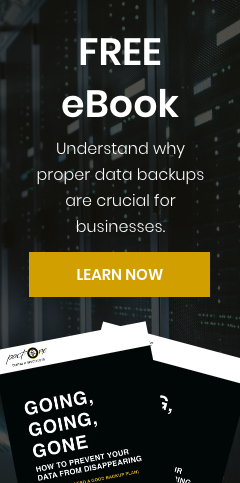Whether it's a cyberattack, natural disaster, or any other unforeseen event, disasters can strike at any moment and disrupt your business operations. As a business owner, it's crucial to prepare for the worst and have a disaster recovery plan in place. In this blog post, we'll take a closer look at what disaster recovery is, why it's important, and how you can protect your business from disasters.
What is Disaster Recovery?
Disaster recovery is the process of recovering your business from a disaster. This process involves restoring your IT infrastructure (hardware, software, data), as well as other business operations, communications, and customer service. The goal of disaster recovery is to minimize downtime, avoid data loss, and restore business operations as quickly as possible after a disaster occurs.
What Qualifies as a Disaster?
A disaster qualifies as any event or circumstance that significantly disrupts your business operations and negatively impacts your revenue and reputation. Disasters are not limited to natural catastrophes but can also be a consequence of man-made factors. Here are some types of disasters your business might face:
-
- Natural Disasters: These can include floods, earthquakes, hurricanes, tornadoes, wildfires, and other severe weather events.
- Cyber Attacks: These involve malicious activities like hacking, phishing, ransomware, or denial of service (DoS) attacks that compromise your systems and data.
- Human Errors: These can range from unintentional data deletion or modification to incorrectly configured systems, often resulting from lack of training or negligence.
- Equipment Failures: These include hardware failures, power outages, or network disruptions that can cause significant downtime.
- Regulatory Compliance Violations: These involve situations where your business fails to meet required standards or regulations – such as HIPAA – leading to fines, sanctions, or legal consequences.
Why is Disaster Recovery Important?
Disasters can have an enormous impact on your business, both in terms of reputable damage and monetary loss. For example, if your dental practice's patient records are stolen due to a data breach, you could lose your patients' trust and face legal penalties. Similarly, if your business experiences a network outage due to faulty hardware, you could experience downtime resulting in frustrated patients and loss of business.
The monetary costs can be significant as highlighted in Uptime Institute’s Annual Outage Analysis 2023 report. According to the report, over 60% of all outages or service interruptions in businesses cost more than $100,000. Additionally, IBM reports in their 2023 Cost of a Data Breach Report the average cost of a data breach in 2023 was $4.45 million, a 15% increase over three years.
How to Protect Your Business from Disasters
There are several steps you can take to protect your business from disasters and minimize the risks. These include:
- Conducting a risk assessment: Identify the types of disasters that could affect your business and assess the potential impact on your operations, finances, and customers.
- Creating a disaster recovery plan: Develop a detailed plan that outlines the steps you need to take in case of a disaster, including backup and recovery processes, communication strategy, and post-disaster analysis and improvement.
- Regular backups: Back up your critical data and systems regularly test your recovery processes to ensure they work as expected.
- Training your staff: Educate your employees on disaster recovery processes and equip them with the knowledge and tools they need to react quickly in case of a disaster.
- Partnering with a managed service provider (MSP): An MSP can help you with disaster recovery planning, implementation, and monitoring, as well as provide ongoing support and maintenance to ensure your business is always prepared for disasters.
How a Managed Service Provider Can Assist in Disaster Recovery
Partnering with a managed service provider (MSP) is a smart choice for any business owner or dental practice owner who wants to protect their business from disasters. An MSP can help you with the following:
- Risk assessment: An MSP can conduct a thorough risk assessment of your business and identify the potential risks and impact of disasters.
- Disaster recovery planning: An MSP can create a comprehensive disaster recovery plan that outlines the steps you need to take in case of a disaster, as well as test and improve your recovery processes.
- Backup and recovery: An MSP can implement and manage backup solutions that ensure your critical data and systems are protected and can be quickly restored in case of a disaster.
- Monitoring and maintenance: An MSP can monitor your systems and networks 24/7 and provide ongoing maintenance and support to ensure your business is always prepared for disasters.
Conclusion
Disaster recovery is a crucial aspect of any business continuity plan, as it helps you prepare for the worst-case scenario and minimize the risks of monetary loss and reputation damage. By creating a disaster recovery plan, regularly backing up your data, training your staff, and partnering with a managed service provider, you can protect your business from disasters and ensure your operations continue no matter what happens. Don't wait for a disaster to strike - start planning your disaster recovery strategy today!
Here at Pact-One, your IT disaster recovery plan is our top priority. We’ll provide you with an effective disaster recovery plan that’s tailored to the needs of your dental practice. You can get in touch with our dental IT specialists at any of our locations in Arizona, California, Nevada, Oregon, and Washington. We’re ready to assist you with all your disaster recovery needs.


